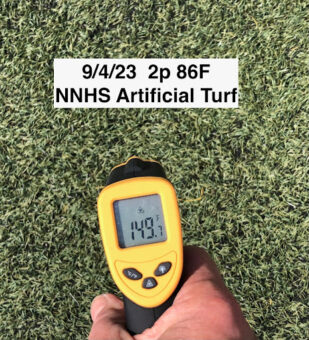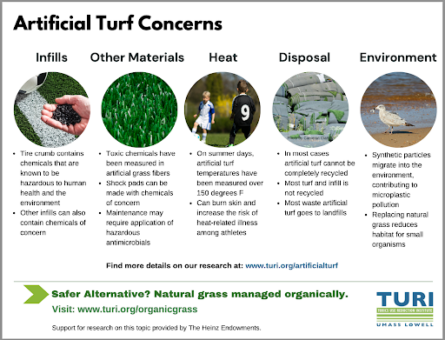Dr. Phil Landrigan is a Newton resident and a leading global public health expert, scientist and pediatrician specializing in pollution and children’s health. When he learned that city councilors are considering Mayor Ruthanne Fuller’s request to fund artificial turf on Tuesday, November 28, he sent city councilors his co-authored Commonwealth Magazine article, “The Term Turf is Misleading,” and a copy of his testimony supporting State bills H. 3948/S. 2057 An Act Prohibiting State and Municipal Contracts for the Purchase and Installation of Artificial Turf Fields.
Health and Safety Risks, Air and Water Pollution
In the article, Dr. Landigan referenced studies that describe the health and safety risks of artificial turf as well as the direct and indirect contamination of surface and groundwater. He cited studies that student athletes are more likely to be injured on plastic turf than on grass, that they are exposed to known carcinogens and neurotoxins, and also are at increased risk of heat illness and infectious complications of turf burns. Professional sports leagues are refusing to play on artificial turf because of the high rate of injuries.
Dr. Landrigan wrote, “According to the New York State Department of Environmental Conservation, surface temperatures on an artificial turf field averaged 35° to 60° Fahrenheit higher than on natural grass; artificial turf fibers have been known to reach 156° F under direct sunlight…The recent spike in student athlete deaths due to heat stroke underscores this risk.”

All Types of Artificial Turf Are Risky
Newton has acknowledged that the crumb rubber infill used in its old artificial turf playing fields is too hazardous to use again. However, there are injury and exposure hazards and pollution from all types of artificial turf regardless of infill type as well as few or no responsible disposal options. The list of known toxic hazards in artificial turf include microplastics, heavy metals, and PFAS that are unsafe at any level of exposure.
Restricting Artificial Turf to Limit PFAS Contamination
As many Massachusetts towns are coping with the high cost of PFAS contamination in public water supplies and private wells, the Massachusetts legislature is considering several bills to stop artificial turf. In addition to H. 3948/S. 2057, the Toxics Free Kids Act (H.318/S.175) would prohibit products that contain PFAS including artificial turf on school properties, publicly owned properties, or intended for use by children under the age of 18. Expert resources and testimony are posted online at Listen to the Experts.

Citizens and Experts Advocate for Better Decisions
At a city council meeting in February 2023, scientists, experts, and public health advocates including leaders of Clean Water Action, Silent Spring Institute, and Physicians for Social Responsibility, urged Newton city councilors to reject the Parks Department’s plans for artificial turf.

In August 2023, the Sustainable Materials Management Commission (SMMC) sent letters to the Mayor and the City Council expressing concerns about the sloppy turf removal process at Newton South and objecting to the waste, toxicity and greenhouse gas emissions of artificial turf. The SMMC recommended that the City replace Newton North High School’s artificial turf field with grass, maintain the grass field at Albemarle, and establish a policy of no new artificial turf fields in Newton.

“Installing artificial turf is the wrong way to level the playing field,” says Dr. Brita Lundberg, Chair of the Health Equity Institute of Massachusetts and Chair of Greater Boston Physicians for Social Responsibility, “Equity does not mean exposing Newton kids to the same toxic hazards as kids who live near a hazardous waste site—yet athletes who play on artificial turf are exposed to many of the same known carcinogens.” As Northeastern Professor Daniel Faber stated at a Newton library forum, “The goal isn’t to pollute each community equally — it is to have no polluted children at all.”
“Why would Newton ban plastic bags and install artificial turf?” asks Eileen Ryan, Beyond Plastics Greater Boston Leader. “One artificial turf field uses the equivalent of 3.2 million plastic bags or 46 million plastic straws. Artificial turf is an ecological, environmental, and human health nightmare. Synthetic turf is toxic from production to use to disposal. It creates heat islands, breaks down into micro-plastics that contaminate the soil, waterways and air and cannot be produced without using toxic chemicals that are linked to a host of human health problems from learning disabilities, to infertility, and cancer.”
On the website SynTurf Decisions there are webinars and studies explaining the health and environmental damage caused by artificial turf. For additional references and activities join the Facebook group Better Action Now on Artificial Turf in Newton.


Recently on Twitter